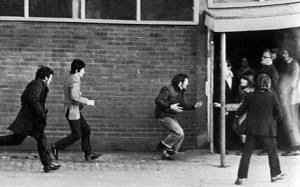Un gruppo di ex paracadutisti del battaglione coinvolto nel Bloody Sunday hanno descritto il rapporto Saville come “fondamentalmente difettoso”
Ma una lettera aperta firmata da 35 ex membri del reggimento paracadutisti, pubblicata ieri, ha accusato Lord Saville di essere giunto a “conclusioni soggettive e imprecise”.
Il gruppo afferma che Lord Saville “ha scelto una posizione e ha gestito le prove per sostenerla”.
La lettera diceva: “(Tony) Blair e Lord Saville sapevano, o avrebbero dovuto sapere, che la mancata partecipazione dei Provisional IRA nel quadro di un’indagine significa che la verità completa non potrà mai essere stabilita.
“(Alla questione) che i fatti siano difficili da stabilire dopo 30 giorni, per non parlare di 30 anni, è stata data anche scarsa considerazione .
“Testimonianze chiare e coerenti sono state scartate e tutte queste persone sono state bollate come bugiardi.
” C’è sempre stata pressione su Saville per produrre qualcosa che potrebbe incontrare l’approvazione dei parenti e della più ampia famiglia repubblicana altrimenti avrebbero protestato, affermando che la sua relazione non era che un altro Rapporto Widgery e ne avrebbero domandata un’altra, questa volta un’inchiesta internazionale “.
I Parà hanno anche attaccato il vice primo ministro Martin McGuinness dicendo: ” una testimonianza più veritiera e attendibile sarebbe difficile da trovare .
McGuinness si riteneva fosse stato “probabilmente armato di un fucile mitragliatore Thompson”, anche se aveva negato di essere in possesso di una mitragliatrice a quel tempo.
La lettera ha anche criticato la mancanza di riferimento al ruolo dell’IRA in quel giorno a Derry, ma ha affermato che “non sorprendeva” perché” farlo avrebbe evidenziato al contribuente britannico che l’inchiesta era stata mal concepita e incapace di stabilire i fatti prima che una singola sterlina fosse stata spesa, e tanto meno più di 200.000.000 sterline pubbliche”.
Mentre la lettera ha ammesso che furono fatti “errori” in quel giorno, chiede perché, oltre al “centinaio” di tumulti di cui la 1 Parà era stata testimone, i soldati utilizzarono proiettili veri durante il Bloody Sunday?
“Sosteniamo sia avvenuto perché il fuoco ostile da parte di elementi della Provisional IRA innescarono una sequenza di eventi che alla fine si rivelò tragica. ”
Ma aggiunge: “Coloro che infransero la legge e portarono disgrazia meritano pienamente di essere puniti”.
Il tenente colonnello Wilford è stato criticato da Lord Saville per aver disobbedito agli ordini, inviando i suoi uomini nella zona cattolica di Bogside a Derry.
Ma i soldati hanno replicato che l’attacco contro il loro comandante è stato un “cinico esercizio per scongiurare la possibilità di critica sul fatto che l’indagine condannava solo gli ufficiali umile rango ed i soldati” .
Gli uomini, che non erano coinvolti nella sparatoria, hanno aggiunto: ” Le qualità del Colonnello Wilford dimostrate in questi anni sono solo alcuni dei motivi per cui i suoi ufficiali e gli uomini lo avrebbero seguito ovunque”ì.
Una copia della relazione sul Bloody Sunday è stata trasmessa al direttore della Pubblica Accusa in Irlanda del Nord.
Tratto da News Letter
Ex-paratroopers criticise findings of Saville report
A GROUP of former paratroopers from the battalion involved in Bloody Sunday have described the Saville Report as “fundamentally flawed”.
But an open letter signed by 35 former members of the Paratroop regiment, which was published yesterday, accused Lord Saville of coming to “subjective and inaccurate conclusions”.
The group said Lord Saville “chose one position and cherry-picked his evidence to support it”.
The letter read: “(Tony) Blair and Lord Saville knew, or should have known, that the non-participation of the Provisional IRA in the inquiry would mean that the complete truth could never be established.
“That facts are difficult to establish after 30-plus days let alone 30-plus years was also given scant regard.
“Clear and consistent eye witness accounts were discounted and all these people branded as liars.
“There has always been pressure upon Saville to produce something which would meet with the approval of the relatives and the wider republican family else they would protest that his report was but another Widgery and demand another, this time international inquiry.”
The former Paras also attacked deputy First Minister Martin McGuinness saying: “a more untruthful and unreliable witness would be hard to find”.
Mr McGuinness was found to have been “probably armed with a Thompson submachine gun”, although he had since denied he was in possession of a machine gun at that time.
The letter also criticised the lack of reference to the role of the IRA on that day in Londonderry but said it was “not surprising” as “to do so would be to highlight to the British taxpayer that the inquiry was ill-conceived and incapable of establishing the facts before a single pound coin had been spent, let alone well over £200 million of them”.
While it admitted “mistakes” were made on the day, it asked why, out of the “hundreds” of riots 1 Para had witnessed, did soldiers use live rounds on Bloody Sunday?
“We submit that it was because the hostile firing by elements of the Provisional IRA triggered a sequence of events which ultimately proved tragic.”
But it added: “Those who broke the law and brought disgrace fully deserve to be punished.”
Lieutenant Colonel Wilford was criticised by Lord Saville of disobeying orders by sending his men into the Catholic Bogside area of Londonderry.
But the soldiers countered that the attack on their commanding officer was a “cynical exercise to head off the possibility of criticism that the inquiry might condemn only lowly ranking officers and men”.
The men, who were not involved in the shootings, added: “The qualities Col Wilford has shown over these past years are but a few of the reasons his officers and men would have followed him anywhere”.
A copy of the Bloody Sunday report has been passed to Northern Ireland’s Director of Public Prosecutions.
